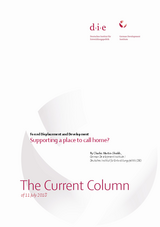The Current Column
Forced Displacement and Development
Supporting a place to call home?
Martin-Shields, CharlesThe Current Column (2018)
Bonn: German Development Institute / Deutsches Institut für Entwicklungspolitik (DIE), The Current Column of 11 July 2018
Bonn, 11 July 2018. After recent marathon negotiation, the EU policy community continues to face serious hurdles in finding a humane, functional way to manage migration in the Mediterranean. The problem is that policy makers are asking the question “how do we stop people from moving”. A better question, one that does not come packaged as a Faustian bargain, is “What are the circumstances under which people will want to stay?” This can be answered using development cooperation tools, and presents an excellent place for policy makers to draw on research to inform policy. One of the key policy responses that has been debated at the European level is supporting embarkation centres in North Africa, where migrants can make asylum claims and apply for regular passage to Europe. This policy is based on constraining migrants’options though, which new research indicates is unlikely to lead to better outcomes for migrants or the EU. If policy makers want to step outside the relatively narrow policy space being debated at the EU level and find creative ways to support migrants in their home countries, the development community’s approach to managing forced displacement and refugee hosting is a good place to look. In the Horn of Africa, the World Bank and IGAD are implementing a project called Development Responses to Displacement Impacts to support refugees and their receiving communities with sustainable social and economic development and governance. Development cooperation tools are well suited for engaging in the development of cities and other spaces of migration, including the development of infrastructure, financial systems, education and administrative apparatus. While there are major challenges to implementing these kinds of policies, what is important is that the policy approach is being increasingly framed through the lens of ‘why would people want to live here’ instead of ‘how do we keep them from leaving’. These development approaches work best though when donors are aware of the varying reasons people choose to leave their homes, or why they would stay in the face of significant hardship. New research recently presented at the German Development Institute / Deutsches Institut für Entwicklungspolitik (DIE) helps explain the complexity around migration decisions, whether it be to move or to stay. While jobs and housing are important factors in helping people settle, they may not be the solution. Anis Fellahi and Eva Youkhana from the Center for Development Research show that efforts in Algeria by local governments to encourage young people to stay in rural areas through offers of jobs and housing had little effect on their choice to leave for urban areas. In large part this was because of complexities at local levels regarding job programme access, and issues with qualifying for housing programmes. While the Algerian case shows how expectations might not match reality, oftentimes people will stay settled in a place when we fully expect them to take flight. The University of Washington’s Nathalie Williams provided an interesting example from Nepal of a police officer staying in his home area in spite of severe threats during the civil war.. He stayed not just because he had a job, but specifically because the job came with a pension. Fundamentally, the job made it possible to support a family over time, which made staying as long as possible worthwhile even in the face of high risks of violence. These examples demonstrate two key things for policy makers to bear in mind regarding migration decisions: Once people decide to move, it is hard to stop them, but if they have something in their home country that is worth keeping they will go to great lengths to stay. People who flee poverty, environmental risks or violent conflict in their home areas want to seek out the best place to settle and build a life. The current migration policy options the EU has put on the table, though, are mainly centred on constraining movement, which is unlikely to achieve a good outcome for either migrants or the EU. A truly sustainable migration strategy should focus on increasing the agency of potential migrants – whether it be through creating new channels for legal migration, or understanding why people choose to settle and then channeling resources towards creating places people would want to call home.


